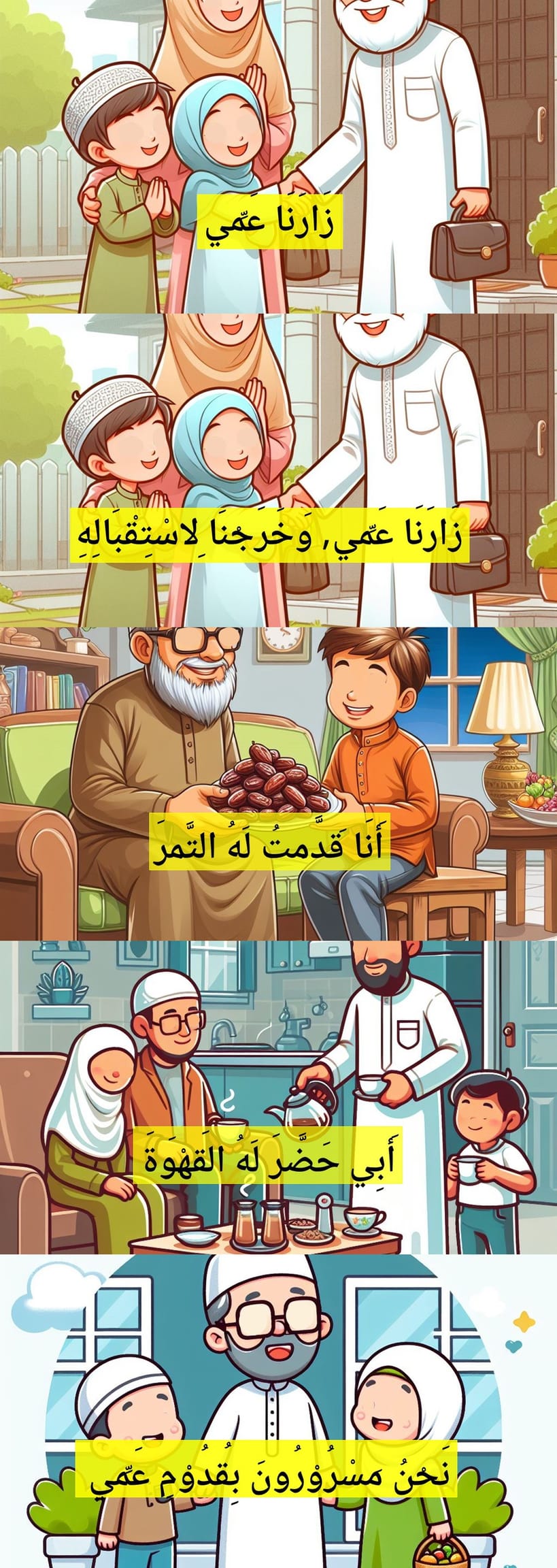Learn Arabic from short story: My uncle's visit | زيارة عمّي
Learning Arabic is fun but can be hard. This article will help you learn Arabic. I'll show you a short story about a family who is happy to see their uncle.
The story is in Arabic and translated word-by-word into English so you can understand how Arabic works.
It also teaches about Arabic word form like Arabic verbs and the conjugation and Ism masdar, and has a quiz to test what you learned. Let's learn Arabic through short stories!
The story in Arabic
زَارَنَا عَمِّي, وَخَرَجْنَا لِاسْتِقْبَالِهِ
أَنَا قَدَّمْتُ لَهُ التَّمْرَ
أَبِي حَضَّرَ لَهُ القَهْوَةَ
نَحْنُ مَسْرُوْرُونَ بِقُدُوْمِ عَمِّي
The translation
My uncle visited us
My uncle visited us, and we went out to meet him
I served dates to him
My father prepared coffee for him
We are happy with my uncle's arrival
A word-by-word translation
1. زَارَنَا عَمِّي, وَخَرَجْنَا لِاسْتِقْبَالِهِ
a. زَارَ : visited
زَارَ is fi'l madi form.
The fi'l mudari' form of زَارَ is زَارَ - يَزُورُ
نَا in زَارَنَا عَمِّي is maf'ul bih (مفعول به) or object. It means "us".
b. عَمٌّ: paternal uncle
ي in عَمِّي is possessive adjective "my".
So, زَارَنَا عَمِّي means "My uncle visited us."
c. خَرَجْنَا: We went out; came out; exit
خَرَجْنَا is fi'l madi form of 1st person plural (نَحْنُ/we)
The base form of خَرَجْنَا is خَرَجَ - يَخْرُجُ
d. اسْتِقْبَالٌ: receiving; meeting; reception
اسْتِقْبَالٌ is masdar of verb اِسْتَقْبَلَ - يَسْتَقْبِلُ
ل in لِاسْتِقْبَالِهِ means "to" or "for"
ه in لِاسْتِقْبَالِهِ is pronoun (3rd person, masculine, singular) that is pointing to عَمِّي
So, زَارَنَا عَمِّي, وَخَرَجْنَا لِاسْتِقْبَالِهِ means "My uncle visited us, and we went out to meet him."
2. أَنَا قَدَّمْتُ لَهُ التَّمْرَ
a. أَنَا : I
b. قَدَّمْتُ : I served
قَدَّمْتُ is fi'l madi form of 1st person singular.
The base verb of قَدَّمْتُ is قَدَّمَ - يُقَدِّمُ
c. لَهُ: for him; to him
d. تَمْرٌ: dates (fruit)
أَنَا قَدَّمْتُ لَهُ التَّمْرَ means "I served dates to him."
3. أَبِي حَضَّرَ لَهُ القَهْوَةَ
a. أَبِي: my father
b. حَضَّرَ: he prepared; made
حَضَّرَ is fi'l madi form of 3rd person masculine singular.
The fi'l mudari' form of حَضَّرَ is يُحَضِّرُ
c. لَهُ: for him
d. قَهْوَةٌ: coffee
أَبِي حَضَّرَ لَهُ القَهْوَةَ means "My father prepared coffee for him."
4. نَحْنُ مَسْرُوْرُونَ بِقُدُوْمِ عَمِّي
a. نَحْنُ: we
b. مَسْرُوْرُونَ: happy
مَسْرُوْرُونَ is ism in plural form, the singular form of مَسْرُوْرُونَ is مَسْرُوْرٌ
c. قُدُومٌ : visiting; coming
قُدُومٌ is masdar of the verb قَدِمَ - يَقْدَمُ
d. عَمِّي: my uncle
نَحْنُ مَسْرُوْرُونَ بِقُدُوْمِ عَمِّي means "We are happy about my uncle's visit." or "We are happy about having a visit from my uncle."
Lesson learned
From the story, we have learned the following things:
1. Fi'l madi form:
a. 1st person singular (أَنَا/I): قَدَّمْتُ
b. 3rd person masculine singular (هُوَ/he): زَارَ, حَضَّرَ
c. 1st person plural (نَحْنُ/we): وَخَرَجْنَا
Additional recap:
a. The base form of fi'l madi (3rd person masculine singular): فَعَلَ
b. 1st person singular form: فَعَلْتُ
c. 1st person plural form: فَعَلْنَا
Example:
a. The base form: كَتَبَ
b. 1st person singular: كَتَبْتُ
c. 1st person plural: كَتَبْنَا
هُوَ كَتَبَ (He wrote)
أَنَا كَتَبْتُ (I wrote)
نَحْنُ كَتَبْنَا (We wrote)
2. Masdar form:
a. اِسْتِقْبَالٌ
b. قُدُومٌ
3. If object is a pronoun, the object is attached directly to verb.
Example: زَارَنَا عَمِّي
In this sentence:
a. زَارَ is fi'l (فعل/verb).
b. نَا is maf'ul bih (مفعول به/object)
c. عَمٌّ is fa'il (فاعل/doer/subject/agent)
Another example: ضَرَبَهُ زَيْدٌ
ضَرَبَهُ زَيْدٌ means "Zaid hit him"
In this sentence:
a. ضَرَبَ is fi'l.
b. زَيْدٌ is fa'il.
c. هُ is maf'ul bih.
Quiz
1. Choose the correct one
a. هُوَ قَدَّمْتُ
b. هِيَ قَدَّمْتُ
c. أَنَا قَدَّمْتُ
2. Choose the correct one
a. هُوَ زُرْتُ
b. أَنَا زُرْتُ
c. نَحْنُ زُرْتُ
3. Choose the correct one
a. نَحْنُ قَدَّمْنَا
b. نَحْنُ قَدَّمَ
c. نَحْنُ قَدَّمْتُ
4. Choose the correct one
a. هُوَ قَدَّمْتُ
b. هُوَ قَدَّمْنَا
c. هُوَ قَدَّمَ
5. Choose the correct one
a. هُوَ حَضَّرَ
b. نَحْنُ حَضَّرَ
c. أَنَا حَضَّرَ
7. Write the following sentences into Arabic:
a. My father visited us.
b. I visited him.
c. We visited her.
8. The base form of the verb "went out" is "خَرَجَ".
Tasfrif (conjugate) this verb to:
a. 1st person singular (أَنَا)
b. 1st person plural (نَحْنُ)
If you want to get key answers, please write in the comment section.



No comments:
Post a Comment